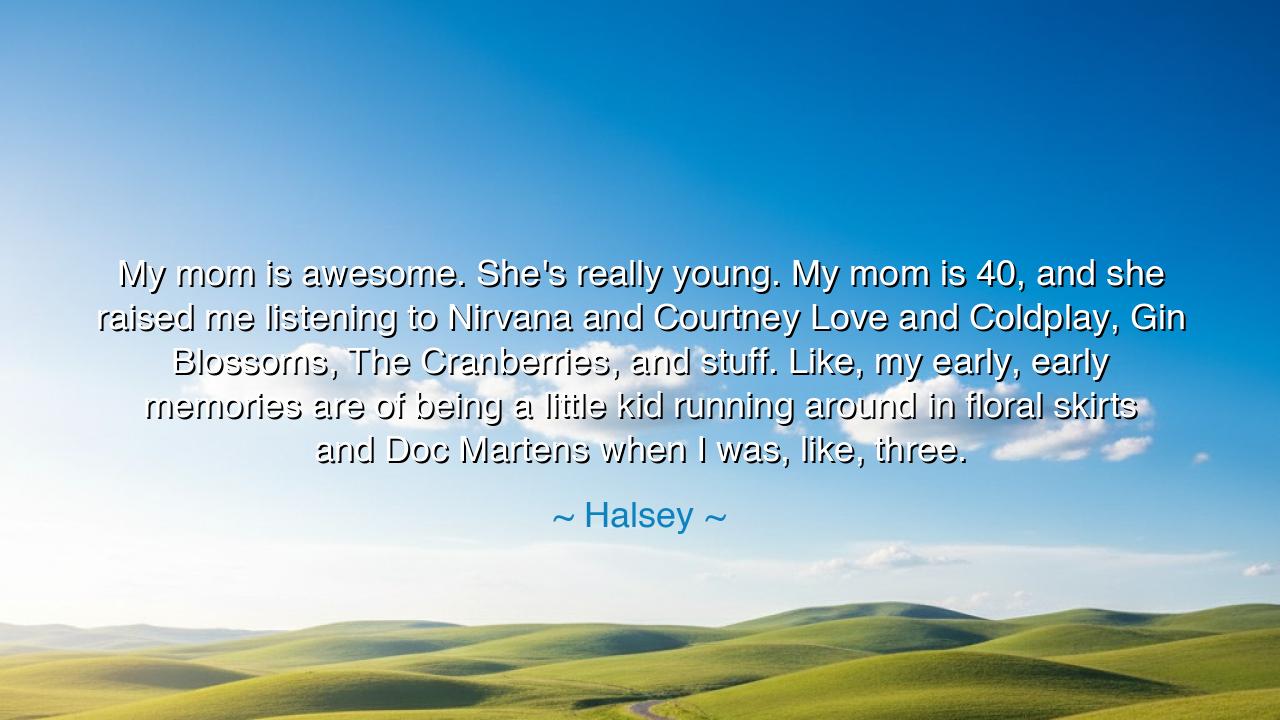
My mom is awesome. She's really young. My mom is 40, and she
My mom is awesome. She's really young. My mom is 40, and she raised me listening to Nirvana and Courtney Love and Coldplay, Gin Blossoms, The Cranberries, and stuff. Like, my early, early memories are of being a little kid running around in floral skirts and Doc Martens when I was, like, three.






There is tender warmth and youthful nostalgia in the words of Halsey, who said, “My mom is awesome. She's really young. My mom is 40, and she raised me listening to Nirvana and Courtney Love and Coldplay, Gin Blossoms, The Cranberries, and stuff. Like, my early, early memories are of being a little kid running around in floral skirts and Doc Martens when I was, like, three.” This is not merely a fond recollection of childhood, but a hymn to the spirit of inheritance — to the way the rhythm of one generation flows into the next. In this remembrance, the singer reveals that her identity was shaped not by strict rules or distant authority, but by music, youth, and shared rebellion — the beautiful energy of a mother who did not only raise a daughter, but raised a kindred spirit.
The origin of this quote lies in Halsey’s reflections on her upbringing — a life where art, freedom, and individuality were not lessons taught, but atmospheres breathed. Her mother, young in years and heart, created a home where emotion was not hidden, and music was the language of the soul. To grow up listening to Nirvana, The Cranberries, and Coldplay is to grow up surrounded by both chaos and beauty, by songs that speak of pain, yearning, and transcendence. Through this inheritance, Halsey came to understand that the soul of an artist is not built in silence — it is born in sound, in the heartbeat of generations that dare to express themselves.
To the ancients, such inheritance would have been sacred. The philosopher Plato spoke of mimesis — the imitation through which character is formed. A child, he said, becomes what they behold. Yet in Halsey’s story, imitation becomes transformation. Her mother’s passion for the music of her youth did not make Halsey a copy of her, but a continuation — an echo that carries new tones. As the poet Kahlil Gibran once said, “Your children are not your children; they are the sons and daughters of Life’s longing for itself.” The mother here is not simply a guardian — she is a bridge through which the wild beauty of one era enters another, renewed and reimagined.
There is something profoundly symbolic in the image of a little girl running around in floral skirts and Doc Martens. It is the image of innocence dressed in rebellion — the harmony between softness and strength. The floral skirts whisper of beauty, sensitivity, and joy; the Doc Martens speak of resilience, defiance, and individuality. It is a portrait of a spirit that would grow into a creator — one who could hold contradictions within her and make them sing. Such is the seed of artistry: to find poetry in paradox, to carry gentleness and fire in the same heart.
We see this same inheritance of spirit throughout history. Consider Mary Shelley, the daughter of the radical philosopher William Godwin and the feminist visionary Mary Wollstonecraft. Raised in the atmosphere of ideas and rebellion, she too absorbed her parents’ audacity and transformed it into art, writing Frankenstein — a work both tragic and revolutionary. Like Halsey, she was shaped by a mother’s courage and a father’s ideals, yet she did not live in their shadow. She carried their essence forward into a creation entirely her own. Thus, we see that the gifts of one generation become the tools of another, not to repeat, but to reinvent.
Halsey’s words remind us that true greatness often begins not with luxury or privilege, but with influence and exposure — the quiet power of being surrounded by expression, rhythm, and love. A mother who plays The Cranberries is teaching her child empathy; one who listens to Nirvana is teaching her honesty; one who plays Coldplay teaches her hope. These are not just songs — they are philosophies set to melody. And in them, Halsey found her own voice, the courage to write her truth in a world that so often fears it.
The lesson, my children, is clear: the legacy of love is not measured by wealth or perfection, but by the freedom it gives the next generation to feel, to dream, to create. Parents who live authentically give permission for their children to do the same. And children who inherit art and spirit must, in turn, carry it forward — reshaping it for their own time. Cherish your influences, honor your roots, and yet do not be bound by them. Let the music that raised you become the foundation of your own symphony.
For as Halsey reminds us, the bridge between generations is not built with obedience, but with understanding. Her mother’s youthful heart became the compass of her creativity. In that shared rhythm between mother and daughter lies a timeless truth: that art, like love, is never truly new — it is the ancient song of humanity, endlessly reborn through those who dare to listen.






AAdministratorAdministrator
Welcome, honored guests. Please leave a comment, we will respond soon